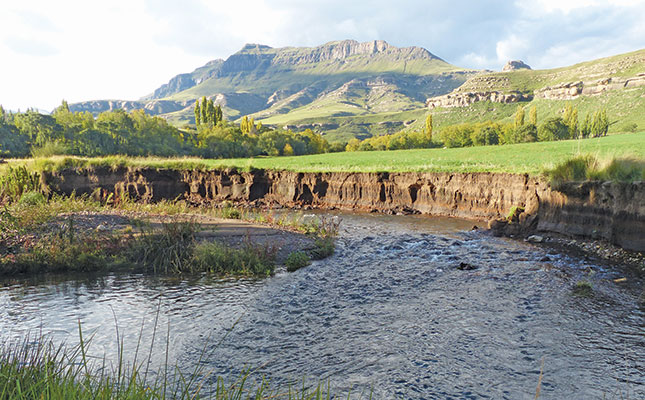The fisherman felt satisfied. The wind had stayed away and although it was hot and humid among the buildings, the fishing was good, especially in front of the old city library.
There was something special that drew shoals of bronze bream, stinkers, large blacktail and even the odd rock cod to feed among the old flowerpots and concrete benches in the library garden with its wrought-iron gate. Game fish such as kingfish and barracuda chased shoals of mullet and shad along streets and alleys and sharks and tuna cruised open residential areas, providing a fishing experience never dreamed of 50 years ago by old-timers in Durban.
Of course, most of the city was lost in the deluge – the rising sea levels, caused by global warming’s melting polar ice-caps during the past few decades. Worldwide, the devastation was horrendous. Not only were all coastal towns and cities under water, but many islands and low lying areas, such as the Florida Keys and much of Japan, no longer existed.
All this, as well as the environmental catastrophe that caused national and global economies to collapse, did not bother our fisherman, as everyone was poor now. He had a shack to live in and enough to eat. Where he sat in his small boat, he could see the circular roof of what used to be King’s Park Stadium, which now really belonged to the sharks.
Nearby, he also ironically saw the huge block-like shape of the old International Conference Centre protruding above the waves. “It was here…”, his father told him, “that they held – back in 2011 – the 17th COP global warming-makietie, attended by politicians, big business people and film stars, who didn’t give a hoot about the future of the planet, but gathered to share the limelight.”
When the incoming tide began to surge around the buildings, he pulled his anchor and started rowing back to his shack on a hill, overlooking the drowned city that now belonged to the ocean.
Is this our future?
Of course the above is an imaginary flight into the future. When I was a youngster I often thought about the future. That’s why I became a conservationist, but I could never imagine that human fertility would become the major factor that would not only endanger the wild creatures, but the planet itself and ultimately jeopardise our own existence.
Neither could I imagine that the population of India, which, in my matric year stood at 400 million, would, during my lifetime, treble to 1,2 million. Or that from then on, the world population would more than double from 3 billion to 7 billion. This means that over the past 50 years, the world population increased by over 2,5 people per second, despite mortality.
The 16 previous COP conferences were supposed to combat global warming. But as with all previous climate change talk-shops, the Montreal and Kyoto Protocols included, they avoided and did not even mention the basic cause of environmental problems – uncontrolled human population growth. Consequently, they achieved nothing.
I’m sure it will not be on the agenda at COP 17 in Durban either, but there are other reasons why this ‘greatest event in the city’s history’ is a failure before it has even started.
Not for nothing was COP 15 in Copenhagen called “Nohopenhagen” before it even started. Like so many before, it was hosted by a country with very dirty hands. Denmark not only derives about 90% of its electricity from coal, but it’s the biggest slayer of small whales and dolphins on the planet. Since the 18th century it has annually systematically rounded up over 250 000 dolphins and pilot whales in the North Sea and driven schools of them by boat into the fjords of the Faroe Islands. Here people forced them into the shallows and hacked them to death.
In the last 30 years they killed over of 79 000, with predictable results. Since 1980, the population has plummeted by about 80%. These are the same creatures people in other places spare no effort or expense to save when stranded on a beach. I’m no animal rights activist, but I find this repugnant.
To stage an international conference about improved sustainable living and environmental awareness in a country such as Denmark, with so much blood on its hands, not only makes a mockery of such a conference, but is a travesty of justice by any signatory of the Kyoto Protocol.
But Kyoto is in Japan, which, together with the Scandinavian countries Norway and Iceland, still actively participates in commercial whaling, killing 2 000 great whales every year.
Get the basics right
Killing whales may have little to do with climate change, but if you can’t get nations to abide by international treaties about whaling, how on earth are you going to get them to agree to make greater sacrifices to combat climate change? The same goes for South Africa. We generate our electricity from coal. Run-off from hundreds of coal mines, together with acid drainage from gold mines and raw sewage, has devastated our rivers and in many places turned the air into a breathing hazard.
Thanks to Eskom and Sasol we are one of the major polluters in the world. Hosting COP 17 here is like conducting a church service in a brothel. I predict that it will be a tug-of-war between rich and poor countries about who can financially benefit most from ridiculous jokes, such as buying ‘carbon credits’, which bluff only the gullible.
Big polluters such as China, or filthy industries unwilling to reduce pollution, can now buy carbon credits from lesser polluters, that can earn big money for projects they normally can’t afford. Sounds very much like sacrificing an innocent lamb for the sins of the masses. COP 17 will also sell carbon credits to the public to ‘offset’ the 12 000t of carbon it will produce by transporting and catering for 15 000 delegates.
Nedbank even announced a carbon-trading desk for its clients. This money will be used to alleviate unemployment by replacing alien plants with indigenous ones. They should rather have bought birth control pills.
If COP 17 can produce any significant agreements on population control, or persuade our government to change its environmental priorities, I’ll eat my words. But I can’t see that happening while we’re building new coal-fired power stations, or are considering fracking vast areas for shale gas, or pay social grants to women to have more babies.
Although COP 17 will be a hugely expensive social makietie, costing R500 million, the hospitality industry expects to make R800 million from hundreds of delegates and celebrities, instead of leading ecologists, who could perhaps find real solutions. It will, however, probably be just as dead in the water as the old library, where good fishing could at least be enjoyed sometime in the future.
Contact Abré J Steyn on 083 235 4822 or email [email protected].
Caption:
Global warming can turn lush areas into deserts. With desiccated paddies, these Indians compete for the most precious commodity – water. In SA we treat it like dirt.
COURTESY OF ABRÉ J STEYN













